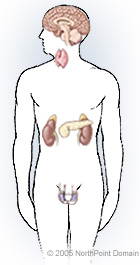Hormonal Therapies

Basic Facts
- Hormonal therapies are most often recommended for use in the treatment of male sexual dysfunction, male infertility, and the treatment of prostate cancer.
- Hormone therapy (hormone blockade) for prostate cancer decreases levels of androgens, or male hormones (mainly testosterone), in the bloodstream, because they are often the key to the cancer’s growth.
- Hormone therapy for prostate cancer neither cures nor removes tumors; however, it often will alleviate symptoms and cause the cancer to diminish.
Hormonal therapies refer to synthetic forms of sex hormones and hormone blockers used to treat disorders related to the endocrine system.Physicians may prescribe hormone therapies for men who are diagnosed with one of the following:
- Erectile dysfunction;
- Low sperm count and infertility; or
- Prostate cancer.
Hormone therapies may include:
- Testosterone injection;
- Follicle-stimulating hormone, luteinizing hormone (LH), and gonadotropin-releasing hormone;
- Orchiectomy (removal of a testicle);
- Luteinizing-hormone-releasing hormone (LHRH);
- Antiandrogens; and
- Estrogens and progestins.
WHEN IS IT INDICATED?
Physicians suggest hormone therapy when other treatments prove ineffective, such as:
- Behavioral approaches;
- Other drug therapy, or
- Surgical intervention.
PRE-TREAMENT GUIDELINES
Physicians may order the following tests before hormone therapy:
- Blood tests;
- Urinalysis;
- Physical exam; and
- Prostate specific antigen (PSA) test.
WHAT TO EXPECT
Erectile dysfunction
Treatment for erectile dysfunction can include testosterone in the form of an injection, a patch, or a gel.
Low sperm count and infertility
Treatment for low sperm count and infertility can include follicle-stimulating hormone (FSH) and luteinizing hormone (LH), gonadotropin-releasing hormone (GnRH), in the form of injections.
Breast enlargement is the most common side effect of FSH.
Side effects of LH may include:
- Breast enlargement;
- Weight gain; and
- Blurred vision.
The side effects for GnRH include:
- Erectile dysfunction;
- Decreased sexual desire;
- Hot flashes;
- Breast enlargement;
- Anemia;
- Fatigue;
- Weight gain;
- Loss of muscle mass;
- Osteoporosis; and
- Spontaneous fractures.
Prostate cancer
Treatment for prostate cancer can include orchiectomy and hormone suppression drugs, such as:
LHRH analogs. LHRH analogs can be injected or implanted. Patients taking the LHRH implant should see their physician every 3 to 6 months.
The side effects of LHRH analogs may include:
-
Reduced or absent sexual desire;
-
Growth of breast tissue; and
Long-term risk of liver disease and bone loss.
Antiandrogens. Antiandrogens are taken as pills 1 to 3 times a day. Antiandrogens can be taken with LHRH drugs. The hormones may also be combined with chemotherapy or a form of radiation therapy.
Antiandrogens may cause the following side effects:
- Nausea;
- Diarrhea;
- Tiredness;
- Long-term risk of liver disease and bone loss;
- Breast tenderness; and
- Growth of breast tissue.
Estrogens and progestins. Side effects of estrogens may include:
- Nausea;
- Vomiting; and
- Breast swelling.
Side effects of progestins are uncommon, but may include:
- Increased appetite;
- Weight gain;
- Impotence;
- Increased blood sugar levels;
- Increased blood pressure;
- Decreased libido;
- Breast tenderness; and
- Headache.
POSSIBLE COMPLICATIONS
Orchiectomy. The complications of orchiectomy may include:
- Reduced or absent sexual desire;
- Impotence; and
- Hot flashes.
Copyright © 2017 NorthPoint Domain, Inc. All rights reserved.
This material cannot be reproduced in digital or printed form without the express consent of NorthPoint Domain, Inc. Unauthorized copying or distribution of NorthPoint Domain’s Content is an infringement of the copyright holder’s rights.

